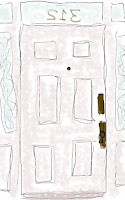Strait
is the gate...
You don’t hear from someone for a
while, then the letters come in bunches.
Dear Ted,
The girl you knew from college that
died about the same time I did, I met her finally, Lisa. Well, you asked me to
look her up, right? “Ask her about Jesus and Aristippos,” you said. Could she
figure out a way to reconcile them, since you’re interested in both. Though why
reconcile them? That’s what I thought, and that’s what she said, too.
“Strait is the gate, and narrow
is the way,” you said. “But that’s the name of a novel by André Gide, isn’t
it?” she said. I said I didn’t know, but she thought she’d read it in college
if she couldn’t remember why. “Not for fun,” she didn’t think. “I
didn’t read much - maybe not at all
- for fun,” she said. She found reading very difficult, the letters kept moving inside
the words, and the words kept moving around on the page, “sometimes even jumping
from one page to another.”
I can see why you liked her. It was a car
wreck, right? Did you say? That’s what I half-remembered, but I didn’t want to
ask. “I may be completely off on that,” she said about the novel. “Maybe not Gide at all.”
We met in a diner for coffee. Well, not really - it doesn’t work that
way, but imagine that it did. A diner with a Bible - of course! And we found
the passage. It’s in the Sermon on the Mount, right? - Matthew 7:13-14. “Go in
by the narrow gate, for the wide gate and the easy way take you toward
destruction. But strait is the gate and narrow” - or hard? - “is the way that
leads to life.” “Destruction” vs. “life” - “life” not “salvation”? We decided
we’d let you figure that out. Because we didn’t know Greek.
And the context - you can figure that out, too. It’s toward the end of the Sermon, it
looks like - after the blessings, and after the “love your enemies” and the “do not
be anxious” or “judge.” We couldn’t see how Jesus got from those to this.
But there’s a lot not to know we decided, “like whether Gide wrote a
book named Strait is the Gate,” Lisa said. “Or anybody else did,” I said. “Well,” she said,
“probably somebody.” “Right,” I said.
Love,
Moira
P.S. Can you find out? Also, what it’s
about if it is?
01.16.20
_______________
* Links to the Moira “story,” click here. Link to “André Gide” by m ball, here.




